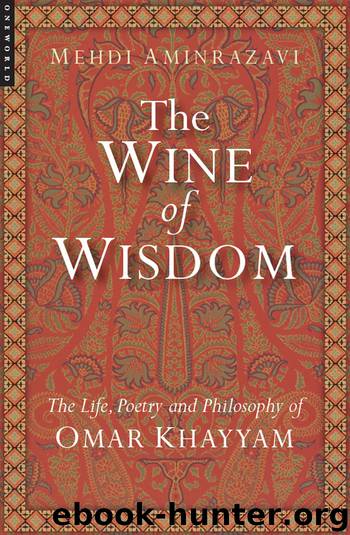The Wine of Wisdom by Aminrazavi Mehdi;

Author:Aminrazavi, Mehdi;
Language: eng
Format: epub
Publisher: Oneworld Publications
One, if not the most important, aspect of our multi-dimensional Khayyam is his mathematical genius and original contributions to fields such as algebra, geometry, arithmetic, physics, music theory, astronomy and meteorology. Khayyam wrote very little in these fields even though sciences and, in particular, mathematics, remained his primary preoccupation. What he did write, however, was dense and ground-breaking. While a detailed discussion concerning Khayyam’s mathematical perspectives would be too technical to include here, a comprehensive work such as this would not be complete without at least a cursory survey on the subject matter.
Despite the fact that much attention has been paid to Khayyam’s view on mathematics in the last century, Khayyam’s philosophy of mathematics remains a neglected area of scholarship. Nasr in his work on Khayyam2 discusses the three basic mathematical ideas which Khayyam treats philosophically. First is the question of mathematical order, namely “where does this order issue from and why does it correspond to the order dominant in the world of nature?”3 Khayyam’s answer, Nasr argues, can be found ironically in his philosophical treatises, especially those in which he treats the subject of existence. According to Khayyam, not only does all existence emanate from God but “also the source of order which is inseparable from the very act of existence. To speak of wujūd is also to speak of order which the science of mathematics studies.”4
The second mathematico-philosophical problem is that of the significance of philosophical speculation in solving the problem of postulates and principles. As it will be demonstrated shortly, Khayyam showed that Euclid’s fifth postulate, called the “parallel postulate”, cannot be proven simply on the basis of the other Euclidean axioms. He used the geometry of converging lines to argue for replacing this postulate. Nasr argues that “the fact that he did not envisage a non-Euclidean geometry, however, was primarily philosophical rather than mathematical. Moreover, in his study of the fifth postulate, Khayyam discussed concepts of space and geometric order which are of much importance to the philosophy of mathematics.”5 Khayyam even refused to introduce the notion of motion as some mathematicians like al-Haytham had done. Motion is a by-product of matter, and Khayyam wanted to avoid using corporeality to solve mathematics, which he thought belonged to the realm of pure intelligibles.
Finally, there is the third principle of Khayyam’s philosophy of mathematics, which is the distinction he made between natural body (al-jism al-ṭabi‘ī) and mathematical body (al-jism al-ta‘limī). While the first type, also called “volume” (ḥajm), is defined as an entity that belongs to the category of accidental attributes and cannot stand on its own independently, the latter belongs to the category of substance and has no external existence in the world. Nasr explains, “The first is the body with which the natural sciences deal and the second is the concern of mathematicians. The distinction made by Khayyam and others between the two types of body in question is … of great significance for the philosophy of mathematics and the relation between mathematics and physics envisaged from a philosophical point of view.
Download
This site does not store any files on its server. We only index and link to content provided by other sites. Please contact the content providers to delete copyright contents if any and email us, we'll remove relevant links or contents immediately.
Hit Refresh by Satya Nadella(9126)
When Breath Becomes Air by Paul Kalanithi(8426)
The Girl Without a Voice by Casey Watson(7885)
A Court of Wings and Ruin by Sarah J. Maas(7821)
Do No Harm Stories of Life, Death and Brain Surgery by Henry Marsh(6938)
Shoe Dog by Phil Knight(5257)
The Rules Do Not Apply by Ariel Levy(4957)
A Higher Loyalty: Truth, Lies, and Leadership by James Comey(4954)
Hunger by Roxane Gay(4922)
Tuesdays with Morrie by Mitch Albom(4770)
Everything Happens for a Reason by Kate Bowler(4734)
The Immortal Life of Henrietta Lacks by Rebecca Skloot(4579)
Millionaire: The Philanderer, Gambler, and Duelist Who Invented Modern Finance by Janet Gleeson(4465)
How to Change Your Mind by Michael Pollan(4355)
All Creatures Great and Small by James Herriot(4311)
The Money Culture by Michael Lewis(4198)
Man and His Symbols by Carl Gustav Jung(4131)
Elon Musk by Ashlee Vance(4121)
Tokyo Vice: An American Reporter on the Police Beat in Japan by Jake Adelstein(3983)
